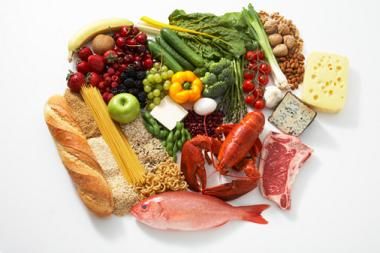B-vitamins (brown rice, chicken, corn ,eggs, green leafs, legumes, meat, nuts, peas, sunflower seeds, nutritional yeast),
Calcium (almonds, brewer’s yeast, green leafs and cruciferous vegetables, fish with bones, sesame seeds, tofu)
Magnesium (green leafs, brown rice, sesame seeds, shrimp, salmon), Tryptophan (turkey, soy foods, peanuts, almonds).
Essential fatty acids necessary for serotonin production are the omega 3’s (fish oils found in mackerel, salmon, sardine, tuna; walnut oil, flax oil) and 6’s (canola oil, chicken, eggs, flax, grape seed oil, safflower oil, sunflower oil, turkey, wheat germ oil) as well as Gamma-Linolenic Acid (black current oil, bluegreen algae, borage oil, evening primrose oil).
Finding ways to manage stress is necessary as long-term stress depletes serotonin levels. Short term stress actually increases serotonin, but after time you get burn-out and it becomes increasingly difficult for the body to produce serotonin.
Avoid stimulants because they deplete serotonin over time. Things like caffeine, refined carbohydrates, chocolate, sugar as well as the heavier stimulants like cold remedies, alcohol, street drugs, diet pills and tobacco should be limited or avoided all together.
Serotonin is made from the amino acid, tryptophan. It is converted to melatonin in the pineal gland. Tryptophan, derived from food, is transported to the brain to make the neurotransmitter serotonin. At the appropriate place inside a brain cell, two enzymes and vitamin B6 transform tryptophan to serotonin. Serotonin is then transferred to the sending end of the neuron where it is used as a molecular messenger to carry information across the synapse to the receiving neuron. …
Serotonin production is sensitive to the supply of tryptophan in the diet. The effects of serotonin were first observed in the digestive tract where it causes contractions of the smooth muscle. In fact,as mentioned above, the largest amount of serotonin is found in the gut. Serotonin is released from blood platelets and elevates blood pressure. Its circuits arise from the brain stem arousal complex and reach into all areas of the brain. Increased serotonin circuit activity tends to activate abnormal behaviors. Too little serotonin is associated with sleep disturbances, loss of appetite and depression. Some antidepressant drugs increase serotonin activity.
One of my favorite foods rich in seratonin is kefir. Kefir is an ancient, cultured food containing amino acids, enzymes, calcium, magnesium, phosphorus, vitamin K and B vitamins. Clinical studies have associated kefir with many beneficial effects including immune enhancement properties. Kefir literally translates to ”feel good” in Turkish (the land of kefier’s origin). The friendly flora, like lacto-bacillus and beneficial yeast help convert the tryptophan in milk to serotonin, the brain chemical that makes you happier. I either make my own or buy mine at the farmer’s market.
Serotonin is a neurotransmitter released into the synapse and bloodstream. However, certain foods cause serotonin to be released like candy, cereal and pasta. Anything with plenty of carbohydrates will increase serotonin levels. However, the effects won’t last long, maybe 2-3 hours. One reason many people over eat carbohydrates is to achieve that temporary “happy” feeling that is produced. However, overeating carbohydrates has MANY long term negative effects and is NOT recommended.
Chocolate, though, when eaten raw (unpasteurized and full of enzymes), is a great source of serotonin.
